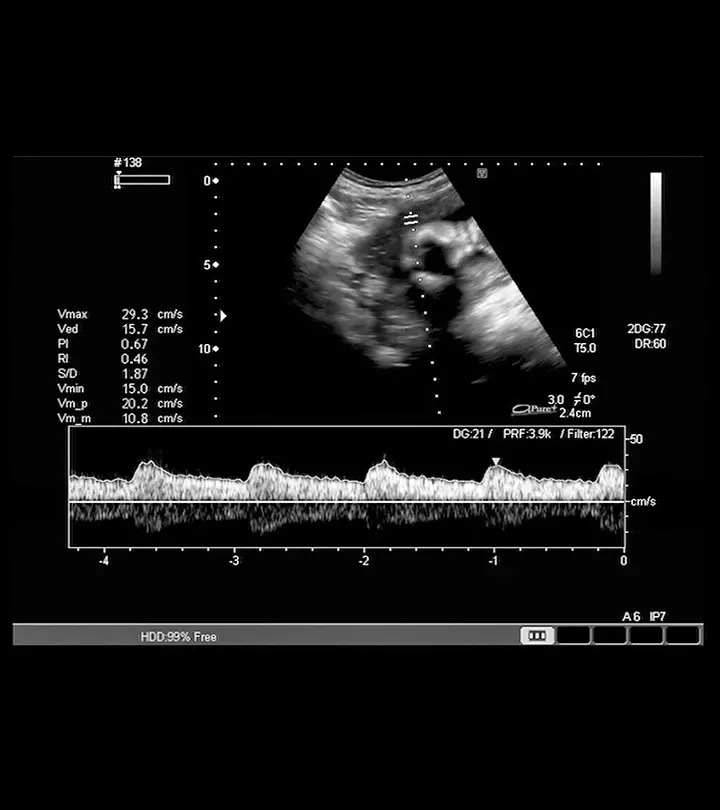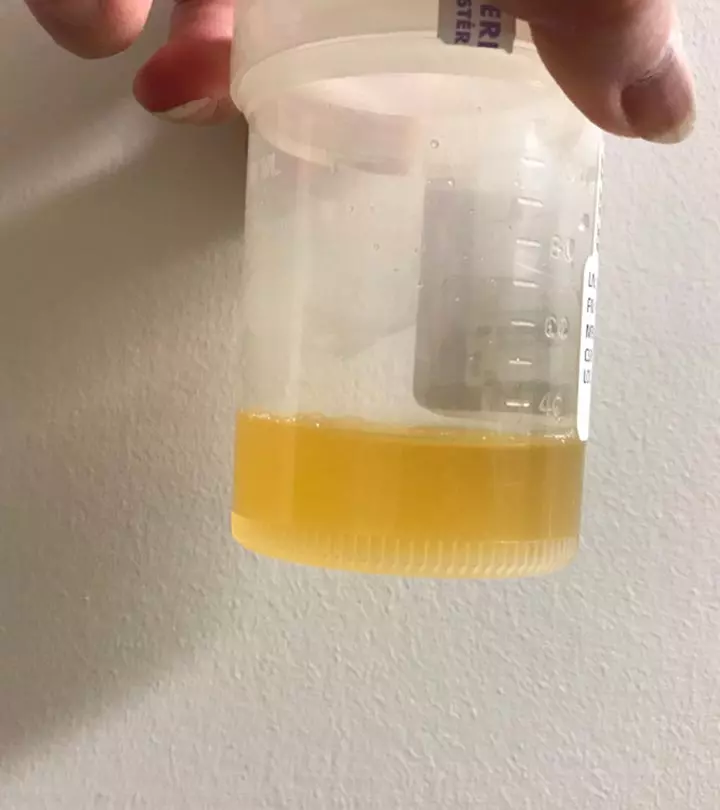
Image: Shutterstock
A dry mouth, also known as xerostomia, occurs when the salivary glands in the mouth produce low or no saliva (1). A dry mouth during pregnancy generally occurs due to hormonal changes (2) (3) (4). However, some underlying issues, such as dehydration, could also contribute to the problem. Saliva is a vital fluid that keeps the mouth clean and assists in several oral functions, such as chewing and swallowing (5) (6). Thus, determining the precise cause of dryness in the mouth can help treat its underlying cause and effectively manage symptoms.
Keep reading to learn the possible causes of dry mouth, its symptoms, and effective treatment.
Key Pointers
- A dry mouth is a common condition in pregnant women, where the salivary glands don’t produce enough saliva.
- Insufficient saliva causes symptoms such as a dry or sticky feeling in the mouth and difficulty speaking or swallowing.
- Xerostomia or dry mouth can occur due to several reasons, such as hormonal changes, dehydration, and gestational diabetes.
- Its treatment may include managing the underlying condition, staying hydrated, and maintaining optimum oral hygiene.
- Contact your doctor if you’re experiencing persistent dry mouth with other symptoms, such as bad breath and oral infections.
Is It Normal To Have Dry Mouth During Pregnancy?
Dry mouth is normal, and it commonly occurs due to an increase in the levels of estrogen and progesterone during pregnancy.
These hormones can cause several changes in oral health that could lead to issues such as dry mouth (4) (7). Usually, dry mouth resolves on its own. However, if the condition persists or is accompanied by other symptoms, seeking prompt medical guidance is essential to maintaining optimal oral health.
Is Dry Mouth A Symptom Of Early Pregnancy?
Dry mouth can be an early pregnancy symptom, in addition to morning sickness, fatigue, nausea, and dizziness. Reduced saliva production due to hormonal changes is one of its common causes. Several women report experiencing dry mouth during gestation. Although it is common, dry mouth during pregnancy often goes unnoticed due to being overshadowed by more noticeable symptoms such as vomiting and fatigue.
What Are The Symptoms Of Dry Mouth During Pregnancy?

Image: Shutterstock
Dry mouth can make tasting, chewing, and swallowing food difficult. Some other symptoms associated with dry mouth include (1) (4) (7) (8) (9):
- Bad breath
- Dry and pale white tongue
- Sticky or dry feeling in the mouth
- Burning feeling in the mouth
- Excessive thirst during pregnancy
- Hoarse voice
- Sore mouth
- Nasal dryness
- Difficulty in speaking
When Does Dry Mouth Start In Pregnancy?
Dry mouth during pregnancy can begin at any time though it is commonly reported in the first and third trimesters
. According to the American Dental Association (ADA), dry mouth symptoms worsen at night because saliva production reaches its lowest circadian levelsiA natural internal process of the body that regulates the sleep-wake cycle of an individual every 24 hours during sleep (1). The symptoms may also worsen during the day when the body is dehydrated. Therefore it’s important to recognize the signs of dehydration in pregnancy.
What Causes Dry Mouth In Pregnancy?
Besides hormonal changes, dry mouth during pregnancy may occur due to several reasons, including (10) (11):
1. Dehydration
Staying hydrated during pregnancy is crucial to support the baby’s proper development. However, if you are losing more fluids than what you take, it could lead to dehydration. Dehydration during pregnancy can occur due to several reasons, such as excessive vomiting, profuse sweating, or insufficient fluid intake. (12). Along with dry mouth, other symptoms of dehydration include – dark yellow urine, fatigue, excessive thirst, and dizziness.
 Experts say
Experts say2. Medications

Image: Shutterstock
Certain medicines, such as antihistaminesiA class of drugs used to treat allergies and their symptoms , decongestants, and antihypertensives, may reduce saliva production, making your mouth dry. Speak to your doctor about the recommended fluid intake you should aim for to prevent dehydration and effectively manage symptoms associated with dry mouth.
3. Increased blood volume
During pregnancy, the blood plasma volume increases by 45 to 50%, which can cause sodium and water retention in the kidneys, leading to frequent urination (13). Insufficient water intake coupled with frequent urination may lead to dehydration and dry mouth (14) (6).
4. Hyperemesis gravidarum
Characterized by excessive nausea and vomiting, this condition can also lead to dry mouth due to fluid loss from the body (15).
5. Mouth breathing
Breathing through the mouth at night or due to gestational rhinitisiOccurrence of nasal congestion during pregnancy without any sign of respiratory infections or allergies (congested nose) (16), can reduce saliva production and cause dry mouth.
 Point to consider
Point to considerWhat Are The Complications Associated With Dry Mouth During Pregnancy?
A dry mouth can rarely cause pregnancy complications. However, sometimes, it could indicate an underlying condition that may require medical attention. Some of these conditions include:
1. Gestational diabetes
According to the American Diabetes Association (ADA), about 10% of all pregnancies are at risk of developing gestational diabetesiA type of diabetes (high blood sugar) diagnosed for the first time during pregnancy
(17). A pregnant woman with abnormal sugar levels may have a dry mouth (parched mouth) even after drinking enough water and fluids (18).

Image: Shutterstock
2. Oral thrush
Oral thrush, or the oral infection, caused by the fungus Candida albicans, can also lead to a dry or cottony feeling in the mouth. According to a study, oral thrush is associated with systemic diseases, such as diabetes, and medications that can cause dry mouth (19).
3. Sjögren syndrome
Sjögren syndrome is an autoimmune condition where the immune system attacks and damages the salivary gland. Generally, the condition is rare in reproductive women and is mainly associated with menopause. However, if a pregnant woman has Sjögren syndrome, she will have mouth dryness that does not resolve even after the treatment (20).
Describing how she figured out and managed Sjögren’s syndrome and a dry mouth while pregnant, a mother and blogger quotes, “I’m currently pregnant & suffering from Sjögren’s, and I thought I should document my experience. So, I grew up with it (Sjögren’s) and only found out when I took a detailed health exam with my husband because he never took one in his life. The exam included a test of my liver functions, and they found a possible autoimmune reaction and told me to get further tests. I thought it was a false positive because I grew up with it, so I guess I never felt anything was wrong with me.
“When my doctor asked me if I had a dry mouth, I said no because I genuinely believed I didn’t. Turns out I did. I used to fall asleep everywhere. I could even fall asleep standing up in a club. I never thought something was wrong, though; I just thought that I was lame and got tired easily. Some supplements react badly with autoimmune conditions. I was taking colostrum supplements, which are useful for boosting your immune system, but unfortunately, Sjögren’s gets worse with a boosted immune system. I never even realized I had chronic muscle pain until I got medicated and realized my shoulders, neck, and back feel so light and amazing. Once I got medicated, I also ended up with so much energy (i).”
What Are The Consequences of Having A Dry Mouth In Pregnancy?
Generally, a dry mouth in pregnancy does not cause any harm to the baby and the mother.
However, it can be uncomfortable and disruptive and may lead to issues such as (1) (10):
- Halitosis (bad breath during pregnancy)
- Dental caries (16)
- Altered taste
- Difficulty in using dentures, if the woman is using one
- Oral infection
- GingivitisiA mild form of gum disease that occurs due to bacteria buildup and plaque in the mouth
 Quick fact
Quick factHow To Treat A Dry Mouth During Pregnancy?
Since a dry mouth is usually a symptom of an underlying condition, the treatment aims at managing the illness and providing symptomatic relief. For instance, if certain medications induce dry mouth, your healthcare provider may stop or swap the drugs with other alternatives.
They may also provide artificial saliva products, such as gels, sprays, and lozenges, to increase saliva production and relieve associated symptoms. However, certain drugs usually used to treat xerostomia might not be safe for expecting women. In such cases, along with treating the underlying condition, your healthcare provider may advise some home treatments to manage symptoms. These include (8) (9) (11):
- Sip water frequently
- Chew sugar-free gum
- Suck on sugar-free candy or ice chips
- Use a cool or warm mist humidifier, especially if you breathe through your mouth at night
- Avoid drinking alcohol, coffee, sugary drinks, and acidic juices
- Avoid consuming tobacco, candies, spicy and salty foods
- Keep your lips moist by using lip balm
- Use toothpaste and mouthwash specially made for dry mouth
- Brush teeth regularly, preferably after each meal and before bedtime

Image: Shutterstock
When To Call A Doctor?
A dry mouth usually self-resolves in a few days. However, you should contact your healthcare provider if you’ve:
- Difficulty in speaking, chewing, and/or swallowing
- Severe dehydration
- Dental problems such as tooth decay
- Dry mouth that does not get better even after treatment and home remedies
- Medical conditions such as thrush, gestational diabetes, and sleep apnea
Frequently Asked Questions
1. Is dry mouth a symptom of anxiety?
Research suggests that anxiety and stress can reduce the salivary flow rate and lead to dry mouth (22). Pregnant women undergo several changes that make them vulnerable to anxiety (23). Hence, chronic anxiety during pregnancy may be associated with dry mouth.
2. Can drinking too much water cause dry mouth?
In less common cases, drinking too much water can dilute the sodium levels in the body, leading to hyponatremia (low sodium in the blood) (24). Reduced blood sodium levels trigger dehydration, which can reduce saliva production and cause dry mouth. Thus, it is essential to stay optimally hydrated but stay wary of overhydration.
3. Does dry mouth during pregnancy say something about the baby’s gender?
No, there is no association between dry mouth during pregnancy and the prediction of the baby’s gender.
A dry mouth during pregnancy is a bothersome yet benign oral problem that usually occurs due to hormonal changes. However, sometimes, underlying issues, such as gestational diabetes or oral thrush, may also cause it. In most cases, simple home remedies, such as frequently sipping water and maintaining optimum oral hygiene, can help manage the symptoms. However, medical intervention may become essential if the problem becomes persistent and doesn’t respond to home remedies. If it goes unnoticed or left untreated, dryness in the mouth can lead to sore throat and swallowing problems.
Infographic: Possible Causes Of Dry Mouth In Pregnancy
Occasional dryness in the mouth is common and usually not a cause for concern. However, a persistent dry mouth during pregnancy resulting in uncomfortable symptoms, such as chewing and swallowing difficulty, warrants medical evaluation. Our infographic below highlights several reasons that could lead to dry mouth in expecting women. So read on and stay informed! Illustration: Momjunction Design Team
Illustration: Dry Mouth During Pregnancy Causes Symptoms And Treatment

Image: Dall·E/MomJunction Design Team
Personal Experience: Source
MomJunction articles include first-hand experiences to provide you with better insights through real-life narratives. Here are the sources of personal accounts referenced in this article.
i. Sjögren’s & pregnancy – part 1: What’s Sjögren’s?https://workingwithmonolids.blogspot.com/2018/12/sjogrens-pregnancy-part-1-whats-sjogrens.html
References
- Xerostomia (Dry Mouth).
https://www.ada.org/resources/ada-library/oral-health-topics/xerostomia/ - Oral Health Guide for Women.
https://www.ida.org.in/Public/Details/Women - Why is oral health important during pregnancy?
https://www.oralhealthkansas.org/Pregnancy.html - Zeynep Yenen, and Tijen Ataçağ; (2019); Oral care in pregnancy.
https://www.ncbi.nlm.nih.gov/pmc/articles/PMC6883753/ - Dehydration During Pregnancy: What Expecting Mothers Should Know.
https://www.dignityhealth.org/articles/dehydration-during-pregnancy-what-expecting-mothers-should-know - Dehydration During Pregnancy.
https://americanpregnancy.org/womens-health/dehydration-pregnancy/ - Omid Fakheran et al.; (2020); The impact of pregnancy on women’s oral health-related quality of life: a qualitative investigation.
https://www.ncbi.nlm.nih.gov/pmc/articles/PMC7590741/ - Bilal Talha and Suman A. Swarnkar; (2022); Xerostomia.
https://www.ncbi.nlm.nih.gov/books/NBK545287/ - Dry Mouth (Xerostomia).
https://my.clevelandclinic.org/health/diseases/10902-dry-mouth-xerostomia - 8 Tips to Relieve Your Dry Mouth.
https://health.clevelandclinic.org/8-tips-to-relieve-your-dry-mouth%20 - Dry mouth.
https://www.nhs.uk/conditions/dry-mouth/ - Dehydration.
https://my.clevelandclinic.org/health/diseases/9013-dehydration - Jessica M. Faupel-Badger et al.; (2007); Plasma Volume Expansion in Pregnancy: Implications for Biomarkers in Population Studies.
https://aacrjournals.org/cebp/article/16/9/1720/176894/Plasma-Volume-Expansion-in-Pregnancy-Implications - Erry Y. Mulyani et al.; (2021); Effect of dehydration during pregnancy on birth weight and length in West Jakarta.
https://www.ncbi.nlm.nih.gov/pmc/articles/PMC8411261/ - Hyperemesis Gravidarum (Excessive Vomiting).
https://mihp.utah.gov/during-pregnancy/hyperemesis-gravidarum-excessive-vomiting - Santosh Kumar Swain and Tapan Pattnaik; (2021); Otorhinolaryngological manifestations in pregnant women.
https://www.mjdrdypv.org/article.asp?issn=2589-8302;year=2021;volume=14;issue=4;spage=374;epage=379;aulast=Swain - Gestational diabetes and a healthy baby? Yes.
https://diabetes.org/living-with-diabetes/pregnancy/gestational-diabetes - 4 warning signs you may have diabetes.
https://www.geisinger.org/health-and-wellness/wellness-articles/2017/03/22/15/21/4-warning-signs-you-may-have-diabetes - Xiaozhu Chu; (2017); Oral candidiasis: relation to systemic diseases and medications.
https://dentistry3000.pitt.edu/ojs/index.php/dentistry3000/article/view/74 - Suruchi Gupta and Nikhil Gupta; (2017); Sjögren Syndrome and Pregnancy: A Literature Review
https://www.ncbi.nlm.nih.gov/pmc/articles/PMC5267941/ - Anita M. Mark; (2017); Limiting the effects of dry mouth.
https://secure.jbs.elsevierhealth.com/action/getSharedSiteSession?redirect=https%3A%2F%2Fjada.ada.org%2Farticle%2FS0002-8177(17)30467-1%2Ffulltext&rc=0 - Neda Gholami et al.; (2017); Effect of stress, anxiety and depression on unstimulated salivary flow rate and xerostomia.
https://www.ncbi.nlm.nih.gov/pmc/articles/PMC5768958/ - Christine Dunkel Schetter and Lynlee Tanner; (2012); Anxiety, depression and stress in pregnancy: implications for mothers, children, research, and practice.
https://www.ncbi.nlm.nih.gov/pmc/articles/PMC4447112/ - Too much water may leave you high and dry.
https://www.uab.edu/news/youcanuse/item/9654-too-much-water-may-leave-you-high-and-dry
Community Experiences
Join the conversation and become a part of our nurturing community! Share your stories, experiences, and insights to connect with fellow parents.
Read full bio of Dr. Ben Abbes Taarji Hicham
Read full bio of Reshmi Das
Read full bio of Rebecca Malachi
Read full bio of Aneesha Amonz


















